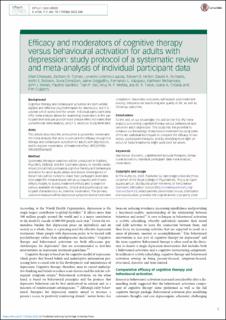| dc.contributor.author | Driessen, Ellen | |
| dc.contributor.author | Cohen, Zachary D. | |
| dc.contributor.author | Lorenzo-Luaces, Lorenzo | |
| dc.contributor.author | Hollon, Steven D. | |
| dc.contributor.author | Richards, David A | |
| dc.contributor.author | Dobson, Keith S. | |
| dc.contributor.author | Dimidjian, Sona | |
| dc.contributor.author | Delgadillo, Jaime | |
| dc.contributor.author | Vázquez, Fernando L. | |
| dc.contributor.author | McNamara, Kathleen | |
| dc.contributor.author | Horan, John J. | |
| dc.contributor.author | Gardner, Pauline | |
| dc.contributor.author | Oei, Tian P. | |
| dc.contributor.author | Mehta, Anuj H. P. | |
| dc.contributor.author | Twisk, Jos W. R. | |
| dc.contributor.author | Cristea, Ioana A. | |
| dc.contributor.author | Cuijpers, Pim | |
| dc.date.accessioned | 2023-03-15T12:39:11Z | |
| dc.date.available | 2023-03-15T12:39:11Z | |
| dc.date.created | 2022-09-05T09:33:08Z | |
| dc.date.issued | 2022 | |
| dc.identifier.citation | BJPsych Open. 2022, 8 (5), . | en_US |
| dc.identifier.issn | 2056-4724 | |
| dc.identifier.uri | https://hdl.handle.net/11250/3058417 | |
| dc.description.abstract | Background
Cognitive therapy and behavioural activation are both widely applied and effective psychotherapies for depression, but it is unclear which works best for whom. Individual participant data (IPD) meta-analysis allows for examining moderators at the participant level and can provide more precise effect estimates than conventional meta-analysis, which is based on study-level data.
Aims
This article describes the protocol for a systematic review and IPD meta-analysis that aims to compare the efficacy of cognitive therapy and behavioural activation for adults with depression, and to explore moderators of treatment effect. (PROSPERO: CRD42022341602)
Method
Systematic literature searches will be conducted in PubMed, PsycINFO, EMBASE and the Cochrane Library, to identify randomised clinical trials comparing cognitive therapy and behavioural activation for adult acute-phase depression. Investigators of these trials will be invited to share their participant-level data. One-stage IPD meta-analyses will be conducted with mixed-effects models to assess treatment effects and to examine various available demographic, clinical and psychological participant characteristics as potential moderators. The primary outcome measure will be depressive symptom level at treatment completion. Secondary outcomes will include post-treatment anxiety, interpersonal functioning and quality of life, as well as follow-up outcomes.
Conclusions
To the best of our knowledge, this will be the first IPD meta-analysis concerning cognitive therapy versus behavioural activation for adult depression. This study has the potential to enhance our knowledge of depression treatment by using state-of-the-art statistical techniques to compare the efficacy of two widely used psychotherapies, and by shedding more light on which of these treatments might work best for whom. | en_US |
| dc.language.iso | eng | en_US |
| dc.publisher | Cambridge University Press | en_US |
| dc.rights | Navngivelse 4.0 Internasjonal | * |
| dc.rights.uri | http://creativecommons.org/licenses/by/4.0/deed.no | * |
| dc.title | Efficacy and moderators of cognitive therapy versus behavioural activation for adults with depression: study protocol of a systematic review and meta-analysis of individual participant data | en_US |
| dc.type | Peer reviewed | en_US |
| dc.type | Journal article | en_US |
| dc.description.version | publishedVersion | en_US |
| dc.rights.holder | Copyright © The Author(s), 2022 | en_US |
| dc.source.pagenumber | 0 | en_US |
| dc.source.volume | 8 | en_US |
| dc.source.journal | BJPsych Open | en_US |
| dc.source.issue | 5 | en_US |
| dc.identifier.doi | 10.1192/bjo.2022.560 | |
| dc.identifier.cristin | 2048696 | |
| cristin.ispublished | true | |
| cristin.fulltext | original | |
| cristin.qualitycode | 1 | |

